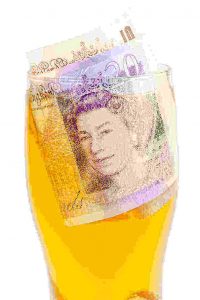Draught beer & sparkling wine’s UK Budget boost

Yesterday’s UK Budget saw the biggest cut to beer duty for 50 years and to cider duty since 1923.
The Chancellor claimed to have taken advantage of leaving the EU to announce “the most radical simplification of alcohol duties for over 140 years” in yesterday’s Budget.
The UK government will take five steps to create a “simpler, fairer and healthier system of taxation for alcohol”.
For example, the number of main duty rates for alcohol has been cut from 15 to just six.
“Our new system will be designed around a commonsense principle: the stronger the drink, the higher the rate,” stated Rishi Sunak, claiming that this measure “will help end the era of cheap, high-strength drinks which can harm public health and enable problem drinking”.
The Chancellor also announced proposals to extend the principle of the Small Brewers Relief to include, for the first time ever, small cider-makers and other producers making alcoholic drinks of less than 8.5% ABV.
Sparkling relief
Over the last decade, consumption of sparkling wines like prosecco in the UK has doubled with English sparkling wine consumption increasing almost tenfold.
“Sparkling wines – wherever they are produced – will now pay the same duty as still wines of equivalent strength,” he stated.
Sales of fruit cider have increased from one in a thousand ciders sold in 2005 to one in four today but these can pay two or three times as much duty as cider made with apples or pears so duty on these too has been cut.
Draught relief
Even before the pandemic, pubs were struggling, with on-trade consumption down 40% between 2000 and 2019.
Rishi Sunak pointed out that many public health bodies recognise that pubs are often safer drinking environments than being at home.
In response, he has announced that a new lower rate of duty will be applied to draught beer and ciders served from draught containers of over 40 litres.
“It will particularly benefit community pubs who do 75% of their trade on draught,” he said.
This Draught Relief measure will cut duty on beer and cider by 5%.
In announcing the duty cuts, the Chancellor effectively cancelled the planned duty increases on spirits like Scotch as well as on wine, cider and beer.
For UK consumers the Budget measures announced mean that:
- duty on a 750ml bottle of still wine at 12% remains at £2.23 until February 2023 when duty will go up to £2.33 (up 10 pence or up to 12p including VAT)
- duty on a 750ml bottle of still wine at 15% will remain at £2.33 until February 2023 when the duty rate will go up to £2.91 (up 68p or 82p including VAT)
- duty on a 750ml bottle of sparkling at 12% remains at £2.86 until February 2023 when it will go down to £2.33 (down by 53p or 64p including VAT)
- duty on a 750ml bottle of fortified wine at 17% remains at £2.98 until February 2023 when it will go up to £3.30 (up 32p or 38p including VAT)
- duty on a 70cl bottle of vodka at 37.5% remains at £7.54 and will remain unchanged.
- duty on a 70cl bottle of gin at 40% remains at £8.05 and will remain unchanged.
These reforms come into effect in February 2023.
According to the British Institute of Innkeeping, the Chancellor has “yet again” recognised the importance of pubs and the communities that they support in this budget.
The BII also “hugely welcomed” the announcement that business rates for 2022/23 are to be reduced by 50% for hospitality businesses.
“The BII has consistently asked for three key support measures for our nations’ pubs” it stated, “full reform of the business rates system as well as a further reduction to support pubs in the short-term; a more permanent reduction in VAT for our sector to reflect the challenging trading conditions over the last 18 months and a reduction in taxes for draught products served in pubs.
“We equally welcome the immediate cancellation of the duty increase on alcohol and the 5% reduction in duty on draught products served in our pubs.
“However” it continued, “the full recovery of our nations’ pubs will take years and they will need long-term support to ensure that they can profitably trade, enabling them to contribute to the wider recovery of the economy and provide vital local employment and career opportunities.
“With the average pub having £51k of debt built up over the course of the pandemic and rising costs in all key areas of their businesses, unless they’re able to trade fully, they’ll continue to be loss-making.
“Pubs were viable businesses in a growing sector before the pandemic and as vital community hubs, the Government needs to do all it can to ensure they can survive the next few critical months.”
BII Chief Executive Steven Alton commented, “We’re encouraged that the Chancellor has yet again referenced the importance of pubs in their communities and specifically as safe spaces for people to enjoy alcohol responsibly.
“Whilst the measures announced are positive steps, pubs continue to face huge challenges across all areas of their business – in staffing, supply chain, deliveries and debt. Trading for their businesses remains difficult.
“Ongoing support will be needed both in the form of a fundamental reform of business rates to rebalance this unfair burden on our pub businesses with the online economy and a long-term reduced VAT rate to support our members’ recovery over the coming years. This investment in our nations’ pubs will ensure that they can play their full part in our collective economic recovery.”
The Wine & Spirit Trade Association also welcomed the Chancellor’s decision to listen to British business and UK consumers by freezing wine and spirit duties.
The decision to freeze alcohol duty could not have come at a better time for the UK wine and spirit industry which not only has to deal with the chaos created by Covid-19 but is also navigating driver shortages and severe supply chain issues, stated the WSTA.
“The Chancellor should be commended for listening to our calls for support and understanding that punishing tax hikes are not the best way to reinvigorate the sector,” commented WSTA Chief Executive Miles Beale, “By offering continued respite to the UK wine and spirit sector his actions will help save jobs and – in time – replenish revenues to the Treasury through growth in our potential-filled sector.
“We welcome the reduction of the sparkling wine supertax which is long overdue. However, while simpler, the proposals for the overhaul of a new alcohol taxation system does not make the regime fairer, which was a fundamental aim of the review.
“We’re mystified by a proposal that embeds unfairness between products meaning that beer will be taxed between 8p-19p per unit, wine increases to 26p per unit and spirits remains at 29p per unit,” he concluded.








